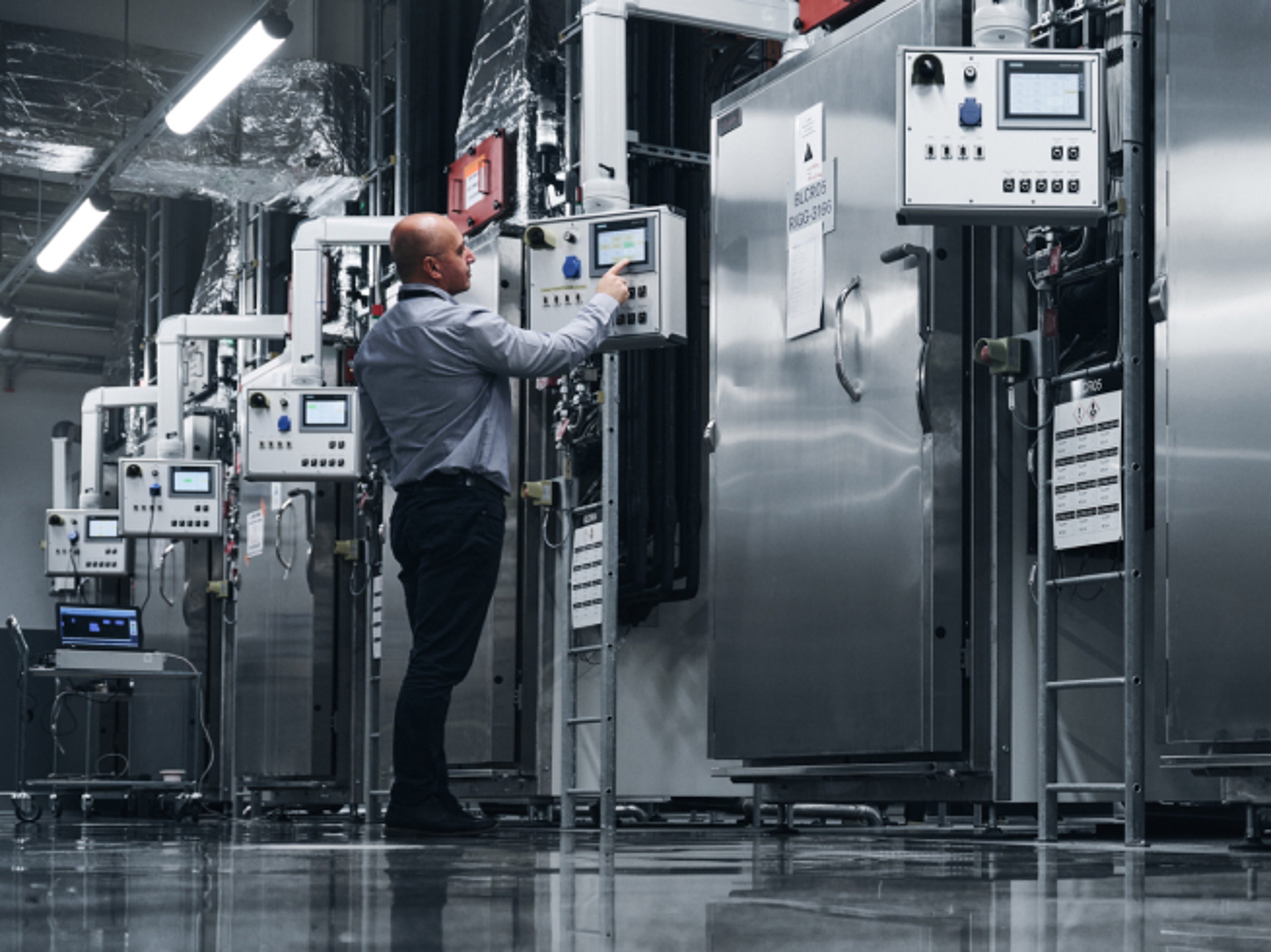Responsible business
We aim to improve and protect people's lives in our value chain and wider society. At its heart, this means doing the right thing – when conducting business, how we behave as employees and treat our workforce, and the expectations we place on our business partners. We want to be a force for good and have a positive impact on people and society.

Our commitment: foster the strong ethical culture within our company.
We aim to ensure equality, protect our people, educate and encourage sustainable behaviour.
We aim to safeguard human rights and ensure responsible business conduct throughout the value chain.
We aim to contribute to a sustainable society by collaborating with stakeholders, investing sustainably and helping to protect the most vulnerable in society.

A new global people standard
The Family Bond by Volvo Cars – equal global parental leave for all.
The Family Bond by Volvo Cars is our all-gender global paid parental leave policy – with this, we give all Volvo Cars employees with at least one year's service 24 weeks of parental leave at 80 per cent of their base pay by default.
This global policy applies to either parent and is suited for a diverse variety of family types, as it includes adoptive, foster care and surrogate parents, as well as non-birth parents in same-sex couples.

A culture where we all belong
We're global and we embrace it by creating a diverse workforce and an inclusive culture that brings out the best in our people. We thrive on being a mixing pot of different ideas, experiences, backgrounds and personalities – this sparks creativity and innovation. Being open to all perspectives, with diverse and inclusive teams in place to make better quality decisions, is critical to our ongoing success.

Lifelong learning and development
Equipping our workforce with essential skills for future success
We believe in lifelong learning, seamlessly integrated into our everyday work. Our goal is to ensure our team possesses the right skills, behaviors, and mindset to achieve our business objectives. Challenges such as global talent shortages, the decreasing lifespan of skills, talent mobility, and technological shifts have increased the requirement for upskilling and reskilling initiatives across our company.
We support our employees’ development through continuous dialogue, feedback, alignment, and yearly individual performance assessments. We also provide upskilling opportunities in key areas such as software, sustainability, electrification, cybersecurity, and various sales channels.
Committed to safety and wellbeing
Nothing is more important than the safety and well-being of our people. This focus applies across our company and is led by the Executive Management Team, in cooperation with our employees, and where applicable their union representatives. We support our employees in leading a healthy lifestyle. This is done by offering healthy food, training facilities, and spaces that provide privacy and quiet for activities such as relaxation, contemplation, and breastfeeding. To further enable work-life balance for our employees we also offer flexible work hours and working from home arrangements where possible.
Every year, we conduct global risk assessments and set ambitious targets. This process is overseen by formal committees, including management and employee representatives representing our entire workforce. We have procedures in place to identify, monitor, mitigate and eliminate risks, accidents and incidents for both our employees and contractors. These procedures include training, raising awareness, and proactively improving our work environment. In all our operations we have trained first aiders, installed AED equipment and 24/7 alarm systems, as well as company-wide crisis preparedness. Over the past 10 years, we have identified and eliminated over 500,000 risks, significantly increasing the safety of our employees . This has resulted in the number of injuries leading to sick leave reaching an all-time low.
Reducing impact on people and planet
We're serious about wanting to reduce our impact on people and planet and we know our responsibility extends beyond our own walls. The what, how and where from must be accounted for when we calculate our impacts. We aim for transparency and traceability throughout our supply chain. For example, we use Blockchain technology as part of our commitment to the responsible sourcing of batteries.

Traceability in supply chains
We recognise that the supply chains of the raw materials used for batteries are complex and associated with environmental, social and governance (ESG) risks. Establishing traceability is a prerequisite for addressing these risks and building responsible supply chains, as it allows us to identify the suppliers in our supply chain and assess their ESG-performance and promote good practice.

Responsible sourcing of batteries
We're committed to responsible sourcing of our batteries. As part of that commitment, we were the first car manufacturer to use blockchain technology in our cobalt supply chain, allowing us to trace the cobalt used in our batteries, from the mine to the car. Since then, we have continued the implementation of blockchain to lithium and nickel as well as tracking of carbon emissions in the battery supply chain. In addition, we run an audit program to ensure that suppliers in the cobalt, lithium and nickel supply chains are conformant with relevant standards and frameworks and to ensure continuous improvement of ESG-performance across our battery supply chain.
What is blockchain technology?

Forest Stewardship Council certified wood
For Volvo Cars it is important to reduce our impact on the planet and we aim for transparency and traceability in our supply chains. In our EX90 we are using FSC certified wood (FSC™ N004117) in the cabin deco panels. FSC shows that the product comes from responsible sources that are environmentally appropriate, socially beneficial and economically viable management of the world's forests.
Ethical leadership
Already in 2019, Volvo Cars was recognised as a World's Most Ethical Company® by the Ethisphere Institute for the third consecutive year. Ethisphere Institute is a global leader in defining and advancing the standards of ethical business practices. Our past participation in the Ethisphere Institute survey was part of our continuous improvement initiatives.

Maria Hemberg, Head of Group Legal & Corporate Governance
“Responsible business is a fundamental part of our culture and our way of doing business.”
This award was a welcomed acknowledgement of our comprehensive Compliance and Ethics Programme, which aims to ensure that our employees and our business partners act responsibly and ethically. Volvo Cars is committed to fostering a culture of Ethical Leadership.
Reporting channel
Our Compliance and Ethics programme is an enabler that promotes responsible business. It's our guide to prevent and detect misbehaviour and mitigate legal and ethical risks – in particular in the areas of corruption, anti-trust, data protection, trade sanctions and human rights. Our confidential, secure Tell Us reporting line allows employees to report any suspected violation of Our Code.

Sustainable financing
The financial community has a vital role to play in accelerating the transition to a low carbon economy. We want to support their growing focus on sustainable investment. Our Green Financing Framework aligns our sustainability strategy with financing opportunities that lead to a positive impact on our shared environment and society. The Framework is aligned with both the ICMA Green Bond Principles (GBP) and the LMA Green Loan Principles (GLP).
By mid-decade, we aim to have 100 per cent of our debt linked to our Green Financing Framework or in a sustainability-linked format.
We use the proceeds for strategic projects in clean transportation: increasing our fully electric cars production capacity and battery assembly; and for research and development of zero emissions vehicles, new electric powertrains and platform technology.
Policy influence
At Volvo Cars, we've been actively supporting policy development across a wide range of topics – including policies aiming to accelerate the transition to zero emission vehicles. We actively support the drive for change in areas such as charging infrastructure development, availability of renewable energy, payment standardisation, charging interface standardisation, research support, incentives and taxation, as well as overall ambition levels.
You're welcome to read the resources in our ESG Policies & Position section and learn more about what we're doing. And of course you're welcome to engage with us where you have expertise you think will help us on our journey.